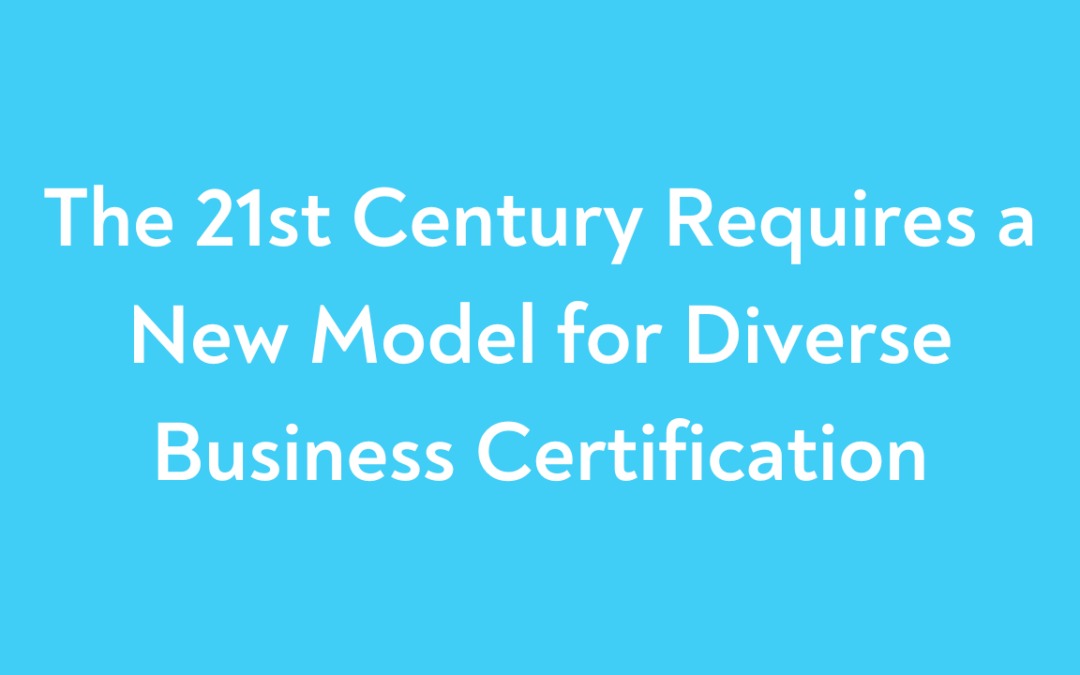The issue of diverse business certification has become a crucial part of modern business interactions that can unlock a world of opportunities for businesses owned by historically marginalized groups. However, the current model of certification often presents hurdles that can be disproportionately challenging for smaller, diverse businesses. It’s time to explore why the current approach needs an update and how we can create a more streamlined, accessible, and effective certification process for the 21st century.
Diverse Business Certification: The Outdated Model
Diverse business certifications are a critical tool designed to substantiate the ownership and operational control of businesses by traditionally marginalized groups. This includes businesses owned by women, racial and ethnic minorities, veterans, LGBTQIA+ individuals, and disabled people. Certifications serve as a testament to the diversity of a business’s ownership, paving the way for these enterprises to gain recognition and visibility in a highly competitive business landscape.
These certifications are more than just formal recognitions; they act as tickets to exclusive opportunities that can supercharge a business’s growth trajectory. One of the most significant opportunities lies in securing lucrative contracts with top corporations. Many leading corporations, recognizing the value of diversity and inclusivity, have established robust supplier diversity programs. These programs are designed to source goods and services from certified diverse businesses, offering them the chance to operate on a scale they might not have access to otherwise.
Being a certified diverse supplier can open doors to partnerships with these corporations, providing not just contracts, but also the opportunity for mentorship, networking, and capacity-building. It’s a symbiotic relationship: corporations benefit from the unique perspectives, innovative solutions, and community connections that diverse suppliers bring, and in turn, these suppliers gain opportunities to grow their businesses, generate jobs, and contribute significantly to the economy.
However, the certification process, often characterized by lengthy procedures, high costs, and rigid requirements, can be a deterrent for smaller businesses. The hurdles in acquiring certifications can inadvertently widen the inequality gap, putting smaller, diverse businesses at a distinct disadvantage.
Many small diverse businesses lack the resources and capacity necessary to navigate the complex certification process. They often struggle with compiling the extensive documentation required, understanding the intricate legal jargon, and meeting the high costs associated with the certification process.
This issue is further amplified when these businesses try to secure contracts with large corporations. Without certification, they can be sidelined in favor of larger, often less diverse businesses, even when they offer competitive products or services. Thus, the current certification process can unintentionally limit opportunities for the very businesses it intends to uplift.
Updating and Improving the Certification Process
As we stride towards a more equitable future, we need to reassess and redefine our approach to diverse business certification. Here are some ways we can revamp and modernize the certification process:
- Streamline Procedures: The certification process needs to be straightforward and user-friendly. This can involve simplifying application forms, providing clear instructions, and offering online platforms for seamless, paperless applications.
- Provide Support: Establish support systems for applicants during the certification process. This can include consultation services, workshops, and guides that can help businesses understand and navigate the process more effectively.
- Flexible Standards: While maintaining the integrity of diverse business certification is vital, we need to ensure that standards don’t exclude small businesses that lack certain resources. One possible approach is to offer different levels of certification, tailored to businesses of various sizes and stages of growth.
- Reduce Costs: Consider revising the pricing model for certifications. This can involve offering sliding scale fees based on the size of the business or providing subsidies for small businesses.
- Promote Transparency: Make the certification process and its benefits more transparent. Clear communication about what the certification entails, the costs involved, and the potential benefits can help businesses make more informed decisions.
A Call to Action: Let’s Reevaluate and Revolutionize
To the organizations that give out certifications, we urge you to reevaluate your certification requirements and processes. This isn’t just a matter of streamlining procedures—it’s about creating an inclusive, equitable business landscape where all businesses, regardless of their size or the diversity of their ownership, can thrive.
By modernizing the diverse business certification process, we can create a future where certifications aren’t just badges of diversity but catalysts of growth and prosperity for all businesses. Let’s build a business world that is not only diverse in ownership but in thought, innovation, and success. The 21st century business landscape demands nothing less.
Key Takeaways
- Diverse business certifications, designed to validate the ownership and operational control of businesses by underrepresented groups, can unlock opportunities such as securing contracts with top corporations. However, the current model needs a revamp to better serve the 21st century business landscape.
- The existing certification process can be challenging, particularly for smaller, diverse businesses. It often involves lengthy procedures, high costs, and rigid requirements, which can widen the inequality gap and put these businesses at a disadvantage.
- The hurdles in acquiring certifications can limit the opportunities for small diverse businesses when securing contracts with larger corporations, as they may be sidelined in favor of larger, often less diverse businesses.
- To create a more inclusive, equitable business landscape, it’s necessary to update and improve the certification process. This could involve streamlining procedures, providing support systems, ensuring flexible standards, reducing costs, and promoting transparency.
- Certification bodies are urged to reevaluate their processes, not just to streamline procedures, but also to ensure an inclusive, equitable business environment where all businesses can thrive, regardless of their size or diversity of ownership.


Recent Comments